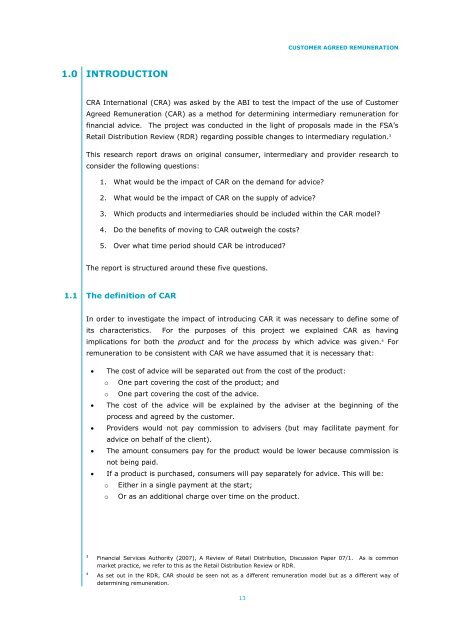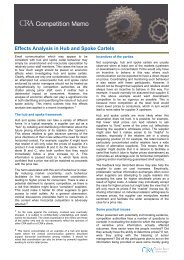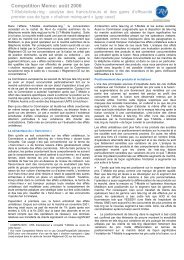CUSTOMER AGREED REMUNERATION - CRA International
CUSTOMER AGREED REMUNERATION - CRA International
CUSTOMER AGREED REMUNERATION - CRA International
You also want an ePaper? Increase the reach of your titles
YUMPU automatically turns print PDFs into web optimized ePapers that Google loves.
1.0<br />
1.1<br />
INTRODUCTION<br />
<strong>CUSTOMER</strong> <strong>AGREED</strong> <strong>REMUNERATION</strong><br />
<strong>CRA</strong> <strong>International</strong> (<strong>CRA</strong>) was asked by the ABI to test the impact of the use of Customer<br />
Agreed Remuneration (CAR) as a method for determining intermediary remuneration for<br />
financial advice. The project was conducted in the light of proposals made in the FSA’s<br />
Retail Distribution Review (RDR) regarding possible changes to intermediary regulation. 3<br />
This research report draws on original consumer, intermediary and provider research to<br />
consider the following questions:<br />
1. What would be the impact of CAR on the demand for advice?<br />
2. What would be the impact of CAR on the supply of advice?<br />
3. Which products and intermediaries should be included within the CAR model?<br />
4. Do the benefits of moving to CAR outweigh the costs?<br />
5. Over what time period should CAR be introduced?<br />
The report is structured around these five questions.<br />
The definition of CAR<br />
In order to investigate the impact of introducing CAR it was necessary to define some of<br />
its characteristics. For the purposes of this project we explained CAR as having<br />
implications for both the product and for the process by which advice was given. 4 For<br />
remuneration to be consistent with CAR we have assumed that it is necessary that:<br />
• The cost of advice will be separated out from the cost of the product:<br />
o One part covering the cost of the product; and<br />
o One part covering the cost of the advice.<br />
• The cost of the advice will be explained by the adviser at the beginning of the<br />
process and agreed by the customer.<br />
• Providers would not pay commission to advisers (but may facilitate payment for<br />
advice on behalf of the client).<br />
• The amount consumers pay for the product would be lower because commission is<br />
not being paid.<br />
• If a product is purchased, consumers will pay separately for advice. This will be:<br />
o Either in a single payment at the start;<br />
o Or as an additional charge over time on the product.<br />
3 Financial Services Authority (2007), A Review of Retail Distribution, Discussion Paper 07/1. As is common<br />
market practice, we refer to this as the Retail Distribution Review or RDR.<br />
4 As set out in the RDR, CAR should be seen not as a different remuneration model but as a different way of<br />
determining remuneration.<br />
13




